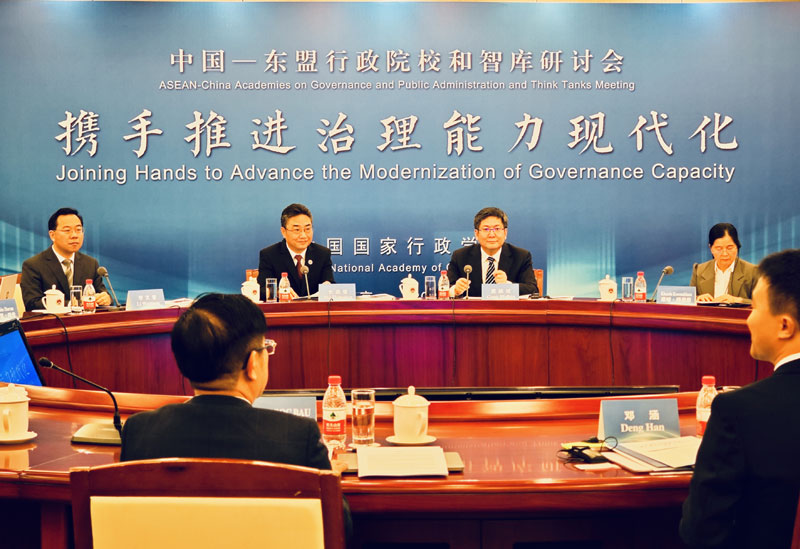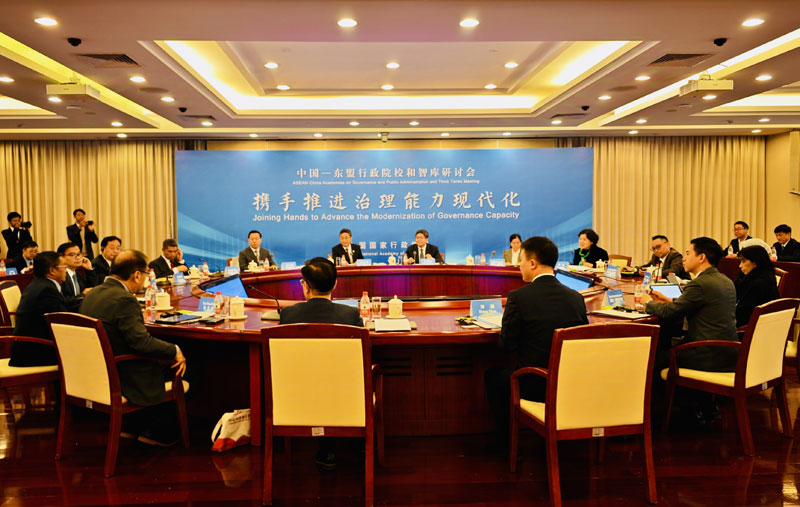
On 30 October, the ASEAN-China Academies on Governance and Public Administration and Think Tanks Meeting, themed by “Joining Hands to Advance the Modernization of Governance Capacity”, was held at the China National Academy of Governance (CNAG) in Beijing. The CNAG Vice President Gong Weibin and Vice President Li Wentang presided over the Meeting. Secretary General Shi Zhongjun of the ASEAN-China Centre (ACC) was invited to address the Meeting attended by leadership of the academies of governance and public administration and think tanks from ASEAN Member States (AMS).
Shi Zhongjun underscored the historical and cultural ties between ASEAN and China, as well as the shared pursuit of economic growth, social progress and sustained modernization, and noted that both ASEAN and China have a long history of governance exchanges, which have played a positive role in respective national development and strengthening their relationship. He also emphasized the need for enhanced cooperation on governance in the face of new challenges, and highlighted the ACC’s role in facilitating governance exchanges between ASEAN and China. Looking ahead, SG Shi Zhongjun reiterated the ACC’s commitment to working with the CNAG and its ASEAN counterparts to advance the modernization of governance on both sides through enhanced concrete cooperation and capacity-building programs.
Gong Weibin and Li Wentang highlighted the historic achievements that China has made in modernizing its national governance system and governance capabilities since the 18th National Congress of the Communist Party of China. They underlined that deepening reform in an all-round manner is a crucial safeguard for modernization. As global and domestic conditions evolve due to economic shifts, political developments, technological advancement and social transformations, the emerging challenges call for effective solutions through updated policies, regulations and reforms. China adheres to a goal-oriented and problem-oriented approach, gradually eliminating institutional obstacles, advancing economic system reform, and building a modern socialist market economy. They welcomed further exchanges on governance to jointly promote modernization of ASEAN and China.

Dignitaries from academies of governance, public administration and think tanks shared insights on their institutions’ operations, focusing on best practices in research and teaching. Each representative provided a comprehensive overview of their institution’s unique approaches, innovative research methodologies and advancements in curriculum design. They expressed a strong desire to collaborate further, recognizing the mutual benefits that could arise from deeper engagement through the ASEAN-China Network of Academies on Governance, Public Administration and Think Tanks. This initiative aims to foster closer ties, promote knowledge exchange and build regional leadership capacity in governance and public administration through expertise sharing and collaborative research.